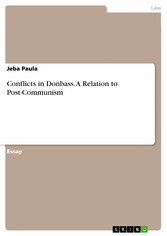Suchen und Finden
Conflicts in Donbass. A Relation to Post-Communism
Essay from the year 2017 in the subject Law - European and International Law, Intellectual Properties, grade: 4.00, , language: English, abstract: The recent armed conflicts in Donbass have reminded the world again of the traces of Post-communism. This paper aims to prove that no event is singular in terms of history and Donbass is also not different. Arguments are presented for proving the underlying relationship between the fall of Communism and the current Donbass war. In the Eastern European countries, a wave of revolutions marked the fall of communism by overthrowing their governments and transferred power to capitalist governments in 1989. These countries gained independence from the USSR and USSR dissolved, creating the present Ukraine and Russia. This fall of communism is one of the direct causes of the current war in the Donbass region of Ukraine, starting in 2014 between the government and the pro-Russian rebels. This armed conflict has its roots in the fall of communism and that they are interconnected between them with nationalist, economical and geopolitical basis. The fall of communism laid the groundwork for the ongoing war in Donbass by creating conflicts between Ukrainian and Russian nationalism. Nationalist resentment between these two countries resulted in Russia-EU and Russia-NATO conflict, which are the main reasons behind the current war.
Alle Preise verstehen sich inklusive der gesetzlichen MwSt.







